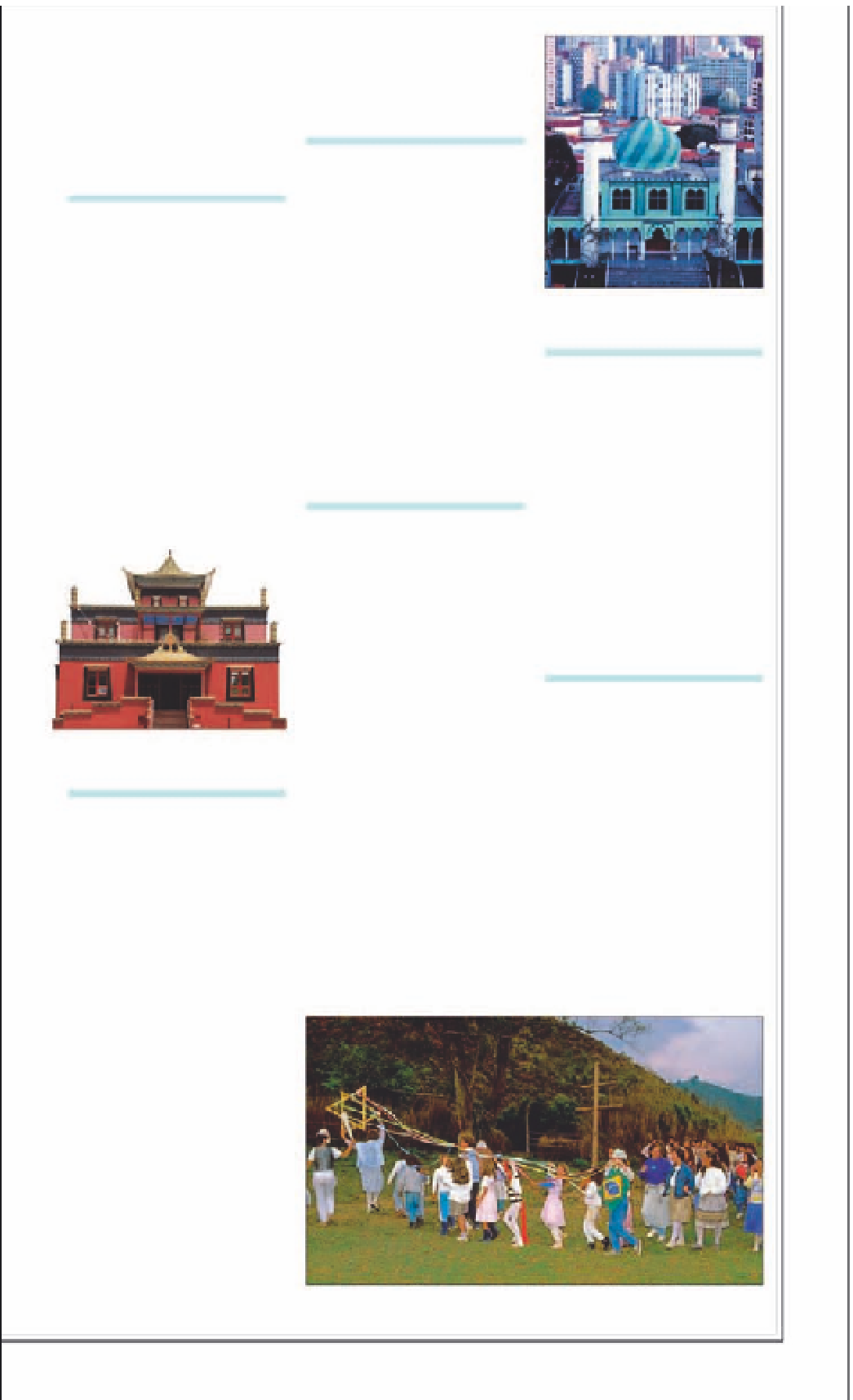Travel Reference
In-Depth Information
church. The movement has
been widely criticized.
Nonetheless, Evangelicalism
is very popular in Brazil, so
much so that populist pol-
iticians often campaign as
Evangelicals in elections.
Krishna Consciousness are
also popular in Brazil,
though often as alternative
lifestyle options.
AFRO-BRAZILIAN
RELIGIONS
West African religions came
to Brazil with slaves and
developed into cults, such
as Candomblé
(p177)
,
Bautuque, and Macumba.
Worship involves the invo-
cation of
orixás
- spirits who
intervene between humans
and Olorun, the supreme
creator. The Brazilian
government legalized their
practice in the mid-19th
century, but followers of
these religions have been
persecuted by the Church.
SPIRITISM
Developed by by the
Frenchman Allan Kardec,
Spiritism is a systematization
of divergent 19th-century
occult practices dealing with
communication with the
spirits of the dead. Kardec
called Spiritism “a science
which deals with the nature,
origin, and destiny of Spirits,
as well as their relationship
with the corporeal world.”
Brazil has the largest number
of Kardecian Spiritists of any
country in the world.
Al Iman Ali Ibn Abi Taleb
mosque in Curitiba
ISLAM
Brazil has the largest Islamic
community in Latin America,
but Islamic fundamentalism
is almost unknown. The
community is private, con-
servative, and is generally
more concerned with
preserving links to Lebanese
and Syrian culture and the
Arabic language than it is
with proselytizing. The
community has produced
numerous prolific writers
and politicians.
INDIGENOUS RELIGIONS
Brazil is home to hundreds
of different indigenous belief
systems. These can all be
loosely banded together as
shamanism, which is not so
much a religion as a distinct
way of understanding reality.
Rather than believing that we
are made of material, indi-
genous peoples believe that
material, time, and space
itself are mere manifestations
of a far deeper reality.
Spiritual life is organized in
harmony with this inner state
by a shaman. A number of
popular religious movements
have grown up in Brazil
from indigenous roots. The
most widely practiced is
Santo Daime, which makes
use of Amazonian psycho-
tropic plants to achieve a
state of super-consciousness.
JUDAISM
Brazil's Jewish community
has about 150,000 members,
most of whom are con-
centrated in São Paulo
(which has the largest
Ashkenazi synagogue on the
continent), Recife, and Rio
de Janeiro. Many are des-
cended from the Jews who
fled Europe in the 1930s.
The community is active
in political and cultural life.
The writer Moacyr Scliar
is one of the country's
successful literary exports.
Chagdud Khadro Ling temple in
Tres Coroâs, Rio Grande do Sul
BUDDHISM & OTHER
ASIAN RELIGIONS
The largest population of
ethnic Japanese in Latin
America and immigrants
from many other East Asian
countries live in Brazil.
Consequently, there are large
communities of Nichiren
Daishonin Mahayana
Buddhists in the country.
Their beliefs are based on
the teachings of a 13th-
century Japanese monk who
stressed the need to elevate
one's state of life from being
trapped within the limits of
desires and instincts. The
method for achieving this
is through strong ethical
practice and the chanting of
the Nam-Myoho-Renge-Kyo
mantra. The movement has
proved especially successful
at bridging Brazil's trenchant
class divide. Yoga and
Santo Daime followers in Visconde de Mauá, Rio de Janeiro


































